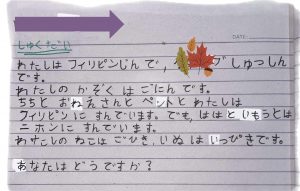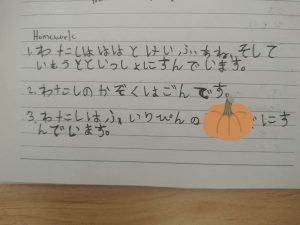ニュース詳細
![]() 2025.11.17
2025.11.17
2025年11月16日(日)、オンライン日本語レッスンを実施しました♪
2025年11月16日(日)、オンライン日本語レッスンを実施しました♪(※English is below.)
今日は「家族」についての呼び方を勉強しました。教える方として、難しいのは、話し相手の配偶者の呼び方ですね。今の日本では「夫」「妻」は男女平等な呼び方ですが、話相手の配偶者を「夫」「妻」という呼び方はメジャーではありません。
とはいえ、「ご主人」「旦那さん」「奥様」などの呼び方は、ジェンダー的には主従関係を連想する言い方のため使うのは避けたい人たちがいるものの、他の呼び方がメジャーでなく困っている人たちもいるのが現状かと思います。
いずれにしても、日本には家族の呼び方がたくさんあることは教えてあげないと耳にしたときにわからないのは困ってしまいますよね。そして、それぞれの意味を伝えた上で、本人たちが何を使うかを考えて選択していくしかないかと思います。
言葉の勉強はその国の歴史や文化の勉強にもなります。そうした学びがあると大変なだけでなく、語学の学習も楽しめますね。
On Sunday, November 16, 2025, we held an online Japanese lesson♪
Today we studied terms for family members. What’s hard to teach is how to call the spouse of the person you’re talking to. While “husband/ otto” and “wife/ tsuma” are gender-neutral terms in modern Japan, calling the other person’s spouse ‘husband/ otto’ or “wife / tsuma” isn’t common.
That said, while some people avoid terms like “go-shujin”, “”dan-na-san, “okusama”, because these terms can imply a gender-based master-servant relationship, the reality is that others face difficulties because alternative terms aren’t widely used.
In any case, it’s necessary to teach students that Japan has many family terms, because they’d be at a loss if they heard these terms without knowing them. After explaining the meaning of each term, the students themselves must then consider and choose which ones to use.
Learning language also means learning about a country’s history and culture. With that kind of learning, it’s not just hard work—language study becomes enjoyable too.


-300x164.jpg)
